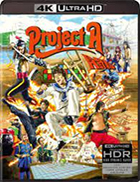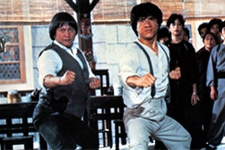| Director: Jackie Chan | | Screenplay: Jackie Chan and Edward Tang | | Stars: Jackie Chan (Sergeant Dragon Ma Yue Lung), Sammo Kam-Bo Hung (Fei), Biao Yuen (Captain Tzu), Dick Wei (Lor Sam Pau), Mars (Jaws), Isabella Wong (Winnie), Tai-Bo (Tai), Hoi-Sang Lee (Li Chou Kou), Hoi-San Kwan (Captain Chi), Wai Wong (Chow Wing Ling) | | MPAA Rating: NR | | Year of Release: 1983 | | Country: Hong Kong |  |
|  When Jackie Chan released Project A (‘A’ gai wak) in late 1983, there had never been a film quite like it in Hong Kong cinema. Sure, there had been Hong Kong pirate movies such as Chang Cheh’s The Water Margin (Shui hu zhuan, 1972) and The Pirate (Da hai dao, 1973). And there had certainly been comedic martial arts movies, a form that Chan had been honing since his starring roles in Snake in the Eagle’s Shadow (Se ying diu sau, 1978), Drunken Master (Jui kuen, 1978), and his early directorial efforts The Fearless Hyena (Xiao quan guai zhao, 1979) and The Young Master (Shi di chu ma, 1980). These kung-fu comedies were particularly notable for the way they broke from the stoic, serious Bruce Lee mold by emphasizing comedy as well as the kinetic dynamism of martial arts married with acrobatics. However, pirates and kung-fu comedy had never been merged, at least not in the way that Chan did as writer, director, and star of Project A, and the result was a new surge of popularity for the star that helped to cement his international status and fully define what a true “Jackie Chan movie” looked like. Unlike virtually all martial arts films at the time, Project A was not set during the 17th and 18th centuries (the high point of the Qing dynasty), but rather in the late 19th century against the backdrop of British colonialism in Hong Kong. This required a great deal of period set dressing and costuming, which up until that time had not been done much in Hong Kong cinema. However, Chan, being the perfectionist that he was, insisted on a broadly realistic depiction of the Chinese coast in the 1880s within which he could set his comedic tale of Hong Kong police, both marine and mainland, fighting against a band of notorious pirates. The first third of Project A feels not unlike a Hong Kong precursor to the Police Academy comedies, as we find Chan’s Sergeant Dragon Ma Yue Lung, a young member of the Marine Police, undercutting and mocking the absurdities of conceited authority figures and leading a rivalry with the Royal Hong Kong Police Force, which culminates in a massive bar brawl that sets the tone for the film’s mixture of slapstick comedy and martial-arts prowess (it has more comical inventiveness in five minutes than most films have in their entire run-time). Dragon and the rest of the Marine Police end up under the authority and training regimen of Hong Tin-tsu (Yuen Biao), the pampered nephew of the stern Police Captain Chi (Kwan Hoi-san). Dragon spends much of the film in an uneasy partnership with Fei (Sammo Kam-Bo Hung), a thief and con artist who nevertheless proves essential in helping him fight against the hulking, tattooed pirate lord Lo Sam-Pao (Dick Wei), who wants to buy stolen police rifles from a pair of gangsters to use in marauding the high seas. The plot, credited to Chan and regular collaborator Edward Tang, does a fine job stringing together the various action/comedy setpieces, and in this regard Project A is one of Chan’s greatest successes. It was certainly the film that truly elevated his reputation for comical/jaw-dropping performative excess (and I mean that in the best way). We see him swinging from chandeliers, climbing to the top of a flagpole, engaging in a lengthy bicycle chase through narrow alleys, and, in the film’s delirious high point (literally), hanging from the hands of a clock tower Harold Lloyd-style. However, unlike the famed silent film comedian, who merely created the illusion of being in danger in Safety Last! (1923), Chan actually hangs and falls from the three-story height, tearing through two cloth awnings before crashing painfully to the ground. Chan actually performed this stunt three times, and we see all three of them in slow motion. But, Chan isn’t always the center of the action, as he is actually quite generous in flooding the film with big moments for his co-stars, especially Sammo Hung, whose awkward girth belies immense martial arts skills and speed. At the time of Project A’s release, Chan was already a well-known figure in Asian cinema; his popularity was high enough that he had his own fan club with a monthly newsletter (he was actually more popular at the time in Japan than in China). After spending much of his childhood learning acrobatics, martial arts, dance, and music at the legendary China Drama Academy, a Peking Opera school (where Hung also studied), he landed bit roles in martial arts films throughout the 1970s. He broke out as a major star at the end of the decade, which caused him to abandon his contract with director Lo Wei and move to the more lucrative Golden Harvest, which produced some of his biggest hits, all of which were inspired to some degree by wu-chou, the Peking opera roles that demanded a complex mixture of stage fighting, comic acting, and acrobatics. He dabbled in international cinema with the U.S./Hong Kong coproductions The Big Brawl (1980), in which he had the starring role, and The Cannonball Run (1981), in which he was a side character, but he didn’t find a great deal of success (although director Hal Needham’s use of outtakes during the closing credits for The Cannonball Run inspired him to do the same in his subsequent films). Thus, there was a lot riding on Project A, especially when it went overbudget and over-schedule. Had it bombed or even been a minor disappointment, it would have been a different world for Chan. Instead, it was a massive success, enabling him to follow his comedic-martial-arts muse into a new decade that saw him produce hit after hit in Southeast Asia while continuing to make inroads in the American market, thus allowing him to become one of the first major crossover Asian stars. Thus, while it may seem to the untrained eye that Project A is just a particularly good Jackie Chan vehicle, it is actually the film that solidified his career and opened up his future. | The Project A Collection 4K UHD + Blu-ray Limited Edition Four-Disc Box Set |  This four-disc 4K UHD / Blu-ray set contains two films: Project A (1983) and Project A Part II (1987). This four-disc 4K UHD / Blu-ray set contains two films: Project A (1983) and Project A Part II (1987). | | Aspect Ratio | 2.39:1 (both films) | | Audio | Cantonese Dolby Atmos (both films)Mandarin Dolby Atmos (both films)Cantonese Dolby Digital 1.0 monaural (both films)Mandarin Dolby Digital 1.0 monaural (both films)English Dolby Digital 1.0 monaural (both films) | | Subtitles | English | | Supplements | Project AAudio commentary by Frank Djeng and FJ DeSanto (Hong Kong Cut) Audio commentary by Frank Djeng (Hong Kong Cut) Interview with Jackie Chan’s stunt double, Mars Cheung“Dancing With Danger”: interview with stuntman Mars“Master Killer”: interview with Grandmaster Lee Hoi-san“The Elusive Dragon”: interview with Yuen Biao“The Pirates Den”: interview with Dick Wei“Can’t Stop the Music”: interview with composer Michael Lai“Project Collector with Paul Dre” “Plan B”: writer Edward Tang on Project AOuttakesJapanese version ending“The Making of Project A” featuretteLunar New Year IntroductionHong Kong trailerEnglish trailerStills gallery Project A Part II Audio commentary by Frank Djeng and FJ DeSanto (Hong Kong Cut) Interview with Anthony Carpio“The Big Boss”: interview with Chan Wai-Man“Someone Will Know Me” 1988 documentary focusing on three members of the Jackie Chan stunt teamJapanese version endingFull-Screen Jackie Chan Recording SessionHong Kong trailerExport trailerTai Seng trailerStills gallerySix double-sided collectable art cardsDouble-sided foldout posters for both films100-page illustrated collectors’ book featuring “Labor of Love: Jackie’s Plan A Worked Out” by Thorsten Boose, “Project A, No Plan B: A Look Into How Project A I & II defined the Jackie Chan 1980s Style” by Paul Bramhall, and “Someone Will Know Me” interview with Roberta Chow by Thorsten BooseDouble-sided artwork for both sleeves featuring new art by “Kung Fu” Bob O’Brien & original Hong Kong posters | | Distributor | 88 Films | | Release Date | October 15, 2024 | | | COMMENTS | | This impressive, beautifully packaged four-disc boxset from 88 Films brings together both Project A and Project A II in its various manifestations, and I cannot imagine that Jackie Chan fans will be anything less than absolutely elated to have it in their hands. Both films have been given brand-new 4K/Dolby Vision HDR10 remasters from the original 35mm camera negatives that have them looking brand-new in their original 2.39:1 aspect ratios (each is included on both a 4K UHD and a Blu-ray disc). Project A is included in both its 106-minute Hong Kong cut and its 115-minute Taiwanese cut, while Project A II includes its 107-minute Hong Kong cut and its 98-minute export cut. The Hong Kong versions of the films include both Cantonese and Mandarin-language options in Dolby Atmos and English monaural. The images on both films look fantastic, with good texture, excellent color saturation, and an almost complete absence of any signs of age or wear. I can’t imagine them looking much better. The newly mixed Dolby Atmos tracks are also great, opening up the soundtrack with some good surround effects and giving all the various punches, crashes, and breaking glass extra depth and punch. In addition to the first-rate picture and audio quality, 88 Films’ box set is stuffed with supplements. On the Hong Kong cut of Project A, we get two new commentaries: one by Hong Kong film specialist Frank Djeng and film producer FJ DeSanto and a solo commentary by Djeng that covers some of the same ground, but also offers a lot of unique insight and history. There are also six video interviews: “Dancing with Danger” is a 16-minute interview with martial-arts actor and stuntman Mars Cheung; “Master Killer” is a 22-minute interview with grandmaster Lee Hoi-san; “The Elusive Dragon” is an 18-minute interview interview with actor Yuen Biao; “The Pirates Den” is a 14-minute interview with actor Dick Wei; “Can’t Stop the Music” is a 17-minute interview with composer Michael Lai; and “Plan B” is a 15-minute interview with screenwriter Edward Tang. In addition, we get “Project Collector With Paul Dre,” a 16-minute tour of Dre’s massive collection of Jackie Chan ephemera; 24 minutes of outtakes; the Japanese version ending; “The Making of Project A,” which, despites its title, is not a documentary, but rather 12 minutes of silent behind-the-scenes footage; a Hong Kong trailer and an English-language trailer; and a stills gallery. Project A II also offers a great new commentary Frank Djeng and FJ DeSanto on the Hong Kong cut, as well as two more substantial video interviews: one with actor Anthony Carpio (25 min.) and one with actor Chan Wai Man (20 min.). We also get a fascinating, 13-minute archival documentary called Someone Will Know Me (1988) that focuses on three members of the Jackie Chan Stunt Team— Mars, Chris Li, and Rocky Lai—against the backdrop of Project A II’s production. There is also a 2.5-minute video of Jackie Chan recording the film’s theme song (which we see in the upper lefthand corner of the screen during the closing credits), three trailers (Hong Kong, export, and Tai Seng), and a stills gallery. And I would be absolutely remiss if I did not mention that the boxset is packaged with six double-sided collectable art cards (three for each film), a double-sided foldout poster for each film, and, best of all, a 100+ page perfect-bound book that is full of informative essays about Jackie Chan and the making of these two films. As I was not deeply familiar with them before reviewing this boxset, I found the information in the book to be very enlightening about their significance, and it helped me to better understand Chan’s career trajectory and why the Project A films were so important to his cementing his global superstardom. The book is well designed and beautifully illustrated with tons of archival images and documents, as well. |
Copyright © 2024 James Kendrick Thoughts? E-mail James Kendrick All images copyright © 88 Films |




 (3.5)
(3.5)

 This four-disc 4K UHD / Blu-ray set contains two films: Project A (1983) and Project A Part II (1987).
This four-disc 4K UHD / Blu-ray set contains two films: Project A (1983) and Project A Part II (1987).